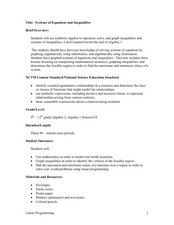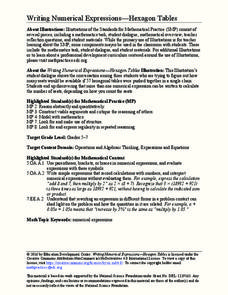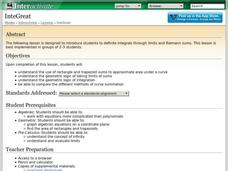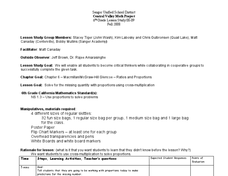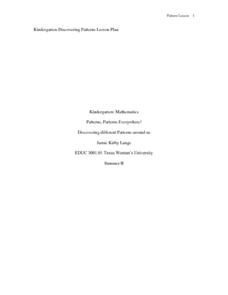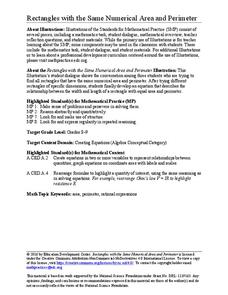Delaware Math Cadre Elementary Committee
Operations and Algebraic Thinking
How to use the relationship between multiplication and division to solve math word problems is the focus of the instructional activity presented here. In it, fourth graders work in groups to solve problems posed by the teacher. Then,...
EngageNY
Using the Identity and Inverse to Write Equivalent Expressions
The fifth installment in the series of 28 lessons helps math scholars explore the result of adding opposite numbers and multiplying reciprocals. Through this exploration, they develop a working definition of identity and inverse properties.
National Security Agency
Equations and Expressions
Learners demonstrate their knowledge pictorially, concretely, and abstractly in this unit meant to last three hours over three days. Using hands-on activities, manipulatives, real-world applications, and problem...
EngageNY
Percent Increase and Decrease
Increase the percent of pupils that are fluent in solving change problems with an activity that asks class members to look at problems that involve either increases or decreases and to express the change in terms of the percent of...
EngageNY
Proof of the Pythagorean Theorem
What does similarity have to do with the Pythagorean Theorem? The activity steps through the proof of the Pythagorean Theorem by using similar triangles. Next, the teacher leads a discussion of the proof and follows it by an animated...
EngageNY
Collecting Rational Number Like Terms
Teach pupils to handle fractions fluently. The sixth installment in the series of 28 has class members apply the concepts learned in previous lessons to expressions with fractional coefficients. The fractions are both mixed numbers and...
National Security Agency
Systems of Equations and Inequalities
High school classes can use manipulatives too! Offer hands-on, interactive lessons that venture away from the typical day in your algebra class. Young mathematicians will be involved in collaborative learning, visual...
Education Development Center
Writing Numerical Expressions—Hexagon Tables
Explore a basic pattern to practice writing expressions. In collaborative groups, learners examine a contextual pattern and write an expression to model it. The task encourages groups to describe the pattern in multiple ways.
BW Walch
Linear & Exponential Functions
Positioned inside the framework of linear and exponential functions, this lesson is more of an investigation into the effects of changing variables and constants inside an expression. The author takes familiar formulas, those for...
Curated OER
Seeing Dots
Your algebra learners interpret algebraic expressions, in order to compare their structures, using a geometric context. They also discern how the two expressions are equivalent and represent a pattern geometrically and algebraically.
Shodor Education Foundation
InteGreat
Hands-on investigation of Riemann sums becomes possible without intensive arithmetic gymnastics with this interactive lesson plan. Learners manipulate online graphing tools to develop and test theories about right, left, and...
Curated OER
Increasing or Decreasing? Variation 2
Your algebra learners will manipulate an expression's form in order to make obvious the value of it increasing, decreasing, or staying the same, when one variable is changed as the others stay constant. Your future physicists'...
EngageNY
From Ratio Tables to Equations Using the Value of a Ratio
Use the value of a ratio to set up equations. The teacher leads a discussion on determining equations from ratio tables in the 13th portion of a 29-part series. Pupils determine which of two equations to use to find the solution....
Curated OER
Sum of Even and Odd
Your algebra learners will make use of structure and manipulate expressions involving function notation using the definition of odd and even functions. They then advance even further to analyze the structure in a system of two equations.
Curated OER
Using Proportions to Solve Problems
Skittles and math? Pupils will work as a class to determine how many orange Skittles are in a large bag by using proportions. They will problem solve, estimate, and share their thinking. Then, they will each receive a small bag of...
Texas Woman’s University
Patterns, Patterns Everywhere!
Not only is pattern recognition an essential skill for young children to develop, it's also a lot of fun to teach! Over the course of this lesson, class members participate in shared readings, perform small group...
EduGAINs
Introduction to Solving Linear Systems
Word problems offer class members an opportunity to learn the concept of solving linear systems using graphs. Individuals choose a problem based upon preferences, break into groups to discuss solution methods and whether there...
Education Development Center
Rectangles with the Same Numerical Area and Perimeter
Is it possible for a rectangle to have the same area and perimeter? If you disregard units, it happens! In a challenging task, groups work to determine the rectangles that meet these criterion. The hope is that learners will naturally...
National Security Agency
A Balancing Act: Solving Multi-Step Equations
Wow! Put on that thinking cap and solve multi-step equations. To solve equations, learners review the use of the distributive property and combining like terms. This three-day lesson comes with about 20 pages of worksheets, warm-ups,...
Virginia Department of Education
Similar Triangles
Pupils work in pairs to investigate what it takes to prove that two triangles are similar. They work through various shortcuts to find which are enough to show a similarity relationship between the triangles. Small groups work with the...
Virginia Department of Education
Congruent Triangles
Is this enough to show the two triangles are congruent? Small groups work through different combinations of constructing triangles from congruent parts to determine which combinations create only congruent triangles. Participants use the...
PBS
Add, Subtract and Multiply Fractions
Your future chefs will appreciate this comprehensive instructional activity where learners practice operations on fractions using pizza and soup analogies. Learners begin with a pizza analogy that requires the learners to...
National Security Agency
What’s Your Coordinate?
Your middle schoolers will show what they know with their bodies when they become the coordinate plane in this conceptual development unit. Starting with the characteristics of the coordinate plane, learners develop their skills by...
Curated OER
Pairs of Whole Numbers
Mathematical reasoning and linear systems are two of the strategies used to solve this number puzzle. Your learners will enjoy the challenge and the variety of ways to approach this challenge.






